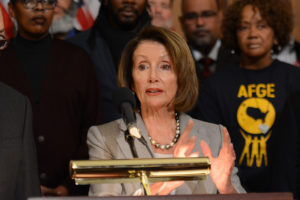
U.S. House Speaker Nancy Pelosi
Much hay was made this week from Democratic House Speaker Nancy Pelosi‘s answer to a Washington Post interviewer’s question about impeaching Donald Trump. Here’s the question and Pelosi’s response:
There have been increasing calls, including from some of your members, for impeachment of the president.
I’m not for impeachment. This is news. I’m going to give you some news right now because I haven’t said this to any press person before. But since you asked, and I’ve been thinking about this: Impeachment is so divisive to the country that unless there’s something so compelling and overwhelming and bipartisan, I don’t think we should go down that path, because it divides the country. And he’s just not worth it.
Many Democrats took to blogs and social media to express their disappointment with Speaker Pelosi’s answer. For example, here’s author and MSNBC contributor Malcolm Nance:
Wrong! What the hell is wrong with the @SpeakerPelosi Congress that they absolve themselves of their duty! Nothing is criminal anymore?! Trump can do and say like a dictator as he pleases? All of his crimes are OK even if you see them? This requires a public outcry. #Disgraceful. https://t.co/7m3lElzP5n
— Malcolm Nance (@MalcolmNance) March 11, 2019
However, what this episode really shows is that the Democratic Party’s base (including a few House members) and its leadership have different considerations that allow them differing degrees of freedom in what they can say publicly at this time.
First, Pelosi’s statement left room for impeachment, i.e., if “there’s something so compelling and overwhelming and bipartisan.”
Second, Pelosi didn’t hold a press conference to raise the impeachment issue. Rather, she was asked about it in an interview. That’s important because …
Third, it’s politically stupid to raise the impeachment possibility prematurely, regardless of how hungry the base is for it. While some Democrats can talk about “crimes” committed by Trump, there is no official factual record yet for such accusations. The House can’t seriously impeach a president unless they have such a factual record. How this record is built is via investigations and/or court rulings. For example, before the House Judiciary Committee voted to impeach President Richard Nixon in 1974 (leading to Nixon’s resignation), Congress investigated Nixon for well over a year, and a federal grand jury issued a “Watergate Report” to the House committee. Likewise, before Republicans impeached President Bill Clinton in December 1998 over his affair with Monica Lewinsky, they waited until after the Starr Report, which advocated impeachment, was released.
While Republicans ran into serious electoral blowback for impeaching Clinton over private, legal behavior, the problem was not in the timing. The Democratic House leadership today likely is looking at a similar timing scenario here, the difference being that they can reasonably expect evidence of actual serious crimes and impeachable wrongdoing this time to be outlined in Special Counsel Robert Mueller’s ultimate report on Russian interference, including alleged conspiracy with the Trump campaign, in the 2016 elections. Likewise, the House, in power for just two months, is now undertaking a number of separate investigations, one or more of which could yield even more of a factual record for impeaching Donald Trump.
Fourth, there are other moving parts in play besides the possibility of impeachment. Specifically, the 2020 elections are 20 months away. If the Democrats do well in those elections, they may have more Senators who could vote to remove Trump if the House impeaches him. In contrast, it’s questionable whether today’s Republican Senate majority and its leader Mitch McConnell would even allow a Senate impeachment trial and removal vote, even though the Constitution gives the Senate the power to do so. Even more importantly, if Trump loses the 2020 election, he could theoretically be indicted and jailed on his way out the White House door, a result that would seem much better for Democrats than an uncertain impeachment. It’s likely that Speaker Pelosi was thinking about this when she answered the reporter’s impeachment question, and that the picture could be far different next year.
Fifth, imagine if Speaker Pelosi had said, “I think it’s premature to think about impeachment now, but as always we’ll do our Constitutional duty.” Many Democrats have stated that some response like this would have been preferable. But if Pelosi had said that, the mainstream media likely would have gone crazy with headlines like “Pelosi Hints at Impeaching Trump!”
This leads to the Sixth consideration: Pelosi still has to deal with Donald Trump. The Constitution requires a majority of both Houses of Congress, plus the president’s signature, for any bill to pass. And now that the Democrats have taken back the House majority, they are passing lots of bills. Of course, the Republican-run Senate may not take up many Democratic House bills. But there are some matters, such as rebuilding America’s roads and bridges, criminal sentencing reform, and others, where both parties interests align and it is possible to get signed legislation that would help both sides and the country. However, such legislation would be unlikely in an even more poisonous atmosphere brought on by irresponsible hints of impeachment by Speaker Pelosi.
All in all, unlike the Democratic base which can say whatever it wants, Speaker Pelosi has to navigate many delicate considerations. She has to be the responsible grownup in the room. However, she has plenty of maneuvering space, once the results of the Mueller investigation and the newly begun House investigations are in, to say that the facts are so serious as to warrant impeachment. Stay tuned.
Photo by AFGE, used under Creative Commons license. https://is.gd/p8gsvM


